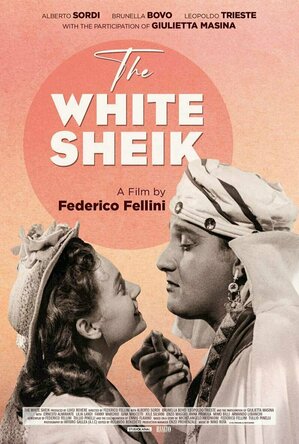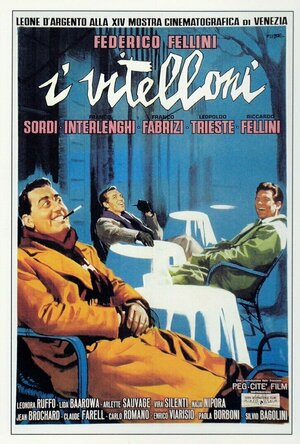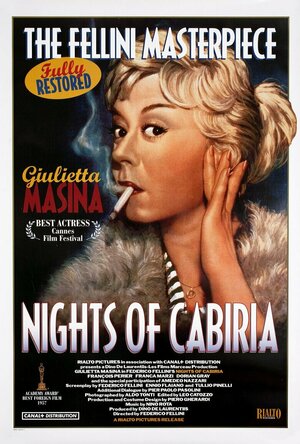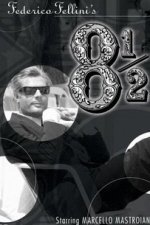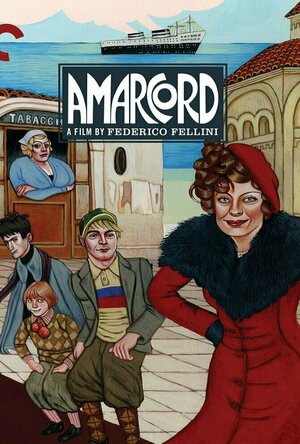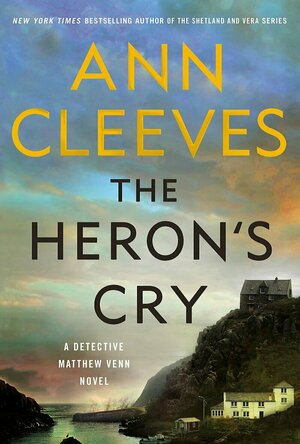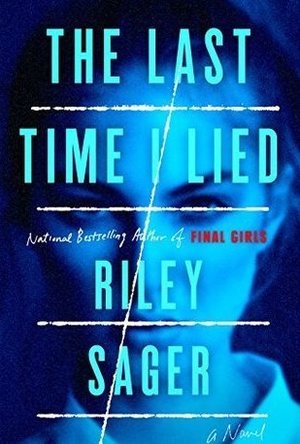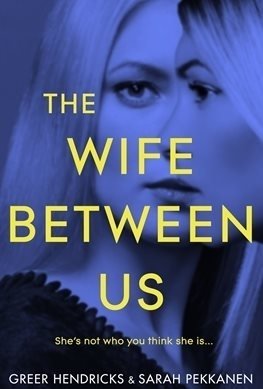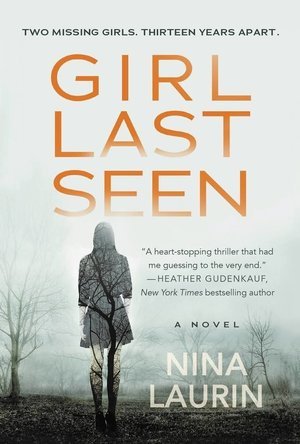Search
Search results
Greg Mottola recommended The White Sheik (1952) in Movies (curated)
Greg Mottola recommended I Vitelloni (1953) in Movies (curated)
Greg Mottola recommended Nights of Cabiria (1957) in Movies (curated)
Greg Mottola recommended 8 1/2 (1963) in Movies (curated)
Greg Mottola recommended Amarcord (1973) in Movies (curated)
Kristy H (1252 KP) rated The Heron's Cry in Books
Sep 16, 2021
An excellent, complex character-driven mystery
Detective Matthew Venn is called out to a farm/artist retreat where Dr. Nigel Yeo has been killed. He's found dead in his own daughter's glassblower studio, stabbed with a shard of one of her vases. Dr. Yeo seems like a nice man: adored by his daughter and a public servant, working to help bring understanding between the public trusts. When a second body is found--killed in a similar way--Matthew realizes that he must dig deep into the secrets and lies of his community to find a killer.
I adore this series and the fact that Detective Matthew Venn, our lead, is a gay man. As with all of Cleeves' books, this is an excellent, solid mystery, with an interesting plot and a team whom you can easily become invested in. Each of her characters is well-written, strong, and original. It's so refreshing, honestly, to read a tale without a crazy unreliable narrator but instead one that simply relies on a strong story and excellent characters. There is a slate of people who could be potential suspects, and we also get backstories for our various detectives: Matthew, Ross, and Jen. Everyone is entwined in this small town (and honestly, if I were them, I'd be a bit worried how many people seem to die there! Cabot Cove, anyone?).
This book kept me guessing the entire time, which I love. I was constantly second guessing myself and wondering who killed whom. It was filled with twists, but nothing wild or unbelievable. This is easily becoming one of my new favorite series. 4+ stars.
I received a copy of this book from St. Martin's Press / Minotaur Books and Netgalley in return for an unbiased review.
I adore this series and the fact that Detective Matthew Venn, our lead, is a gay man. As with all of Cleeves' books, this is an excellent, solid mystery, with an interesting plot and a team whom you can easily become invested in. Each of her characters is well-written, strong, and original. It's so refreshing, honestly, to read a tale without a crazy unreliable narrator but instead one that simply relies on a strong story and excellent characters. There is a slate of people who could be potential suspects, and we also get backstories for our various detectives: Matthew, Ross, and Jen. Everyone is entwined in this small town (and honestly, if I were them, I'd be a bit worried how many people seem to die there! Cabot Cove, anyone?).
This book kept me guessing the entire time, which I love. I was constantly second guessing myself and wondering who killed whom. It was filled with twists, but nothing wild or unbelievable. This is easily becoming one of my new favorite series. 4+ stars.
I received a copy of this book from St. Martin's Press / Minotaur Books and Netgalley in return for an unbiased review.
Kristy H (1252 KP) rated The Last Time I Lied in Books
Mar 6, 2019
Enjoyable, foreboding thriller
Fifteen years ago at Camp Nightingale, three of Emma's fellow campers disappeared, never to be found again. Ever since then, Emma has felt guilt about the incident and her actions that night. She idolized the three girls, especially beautiful Vivian, the leader of the pack, who bossed around Emma and the other two campers, Allison and Natalie. Since then, Emma--now a painter--has been painting huge canvases of landscapes, where she (secretly) paints the girls within each scene. She holds a successful show of her works, but now she's stuck, unable to paint anything else but "the girls," as she calls them. So when the owner of Camp Nightingale, Francesca Harris-White, turns up at Emma's show and tells her she's reopening the camp and she wants Emma to come back as an painting instructor, Emma agrees. Perhaps this will give her the closure she has always lacked and a chance to move on, to begin painting something else. But once back at the Camp--in the same cabin where her friends disappeared-Emma feels watched. Strange things begin happening and Emma starts to wonder more and more about what really happened fifteen years ago.
Well, this was just a fun thriller and a completely engaging read. I'm so glad I gave it a chance, as--unlike most of the reading population, I actually wasn't a huge fan of Sager's FINAL GIRLS and I wasn't entirely sure I was going to read this one. But it was definitely worth the read! This is a quick read and really enjoyable.
Sager populates the novel with a bunch of mysterious pieces that begin to add up across the story--clues, if you will--but you are left constantly wondering as you read. I personally was guessing up until the end, which I really liked. I am always a fan of a thriller that isn't utterly predictable. The novel is told from Emma's perspective, but flips between the present and the past (fifteen years ago, when the three girls went missing initially). This turns out to be an amazingly effective and compelling storytelling format: I read the entire book in about 24 hours and the first half in one setting. You can't quite pinpoint what draws you in, but you find yourself compulsively turning the pages.
Emma is a wonderful unreliable narrator. I enjoyed that she wasn't the requisite annoying unreliable narrator that we seem to see so often: she's tough, engaging, and just happens to be fairly untrustworthy at times to boot. Just when you start to get a bit frustrated and ready to truly know what Emma lied about, Sager spills the beans and the saga continues, with more crazy reveals.
The scene setting in this one is great; while I've never actually been to camp, Sager sets the stage so perfectly: you can just picture everything. The entire novel has this wonderful layer of creepy and mysterious on top of it all. So much of it seems foreboding, which adds to the suspense. And, as many have mentioned, there is a great twist to the ending, which I personally liked.
Overall, I really enjoyed this thriller. It's foreboding, quite readable, and features a main character who draws you in. Between not enjoying FINAL GIRLS and then seeing so much hype for this one, I was ready to be disappointed, but THE LAST TIME I LIED proved me wrong: it was a really engaging and suspenseful read. 4+ stars.
I received a copy of this novel from the publisher and Netgalley in return for an unbiased review (thank you!).
Well, this was just a fun thriller and a completely engaging read. I'm so glad I gave it a chance, as--unlike most of the reading population, I actually wasn't a huge fan of Sager's FINAL GIRLS and I wasn't entirely sure I was going to read this one. But it was definitely worth the read! This is a quick read and really enjoyable.
Sager populates the novel with a bunch of mysterious pieces that begin to add up across the story--clues, if you will--but you are left constantly wondering as you read. I personally was guessing up until the end, which I really liked. I am always a fan of a thriller that isn't utterly predictable. The novel is told from Emma's perspective, but flips between the present and the past (fifteen years ago, when the three girls went missing initially). This turns out to be an amazingly effective and compelling storytelling format: I read the entire book in about 24 hours and the first half in one setting. You can't quite pinpoint what draws you in, but you find yourself compulsively turning the pages.
Emma is a wonderful unreliable narrator. I enjoyed that she wasn't the requisite annoying unreliable narrator that we seem to see so often: she's tough, engaging, and just happens to be fairly untrustworthy at times to boot. Just when you start to get a bit frustrated and ready to truly know what Emma lied about, Sager spills the beans and the saga continues, with more crazy reveals.
The scene setting in this one is great; while I've never actually been to camp, Sager sets the stage so perfectly: you can just picture everything. The entire novel has this wonderful layer of creepy and mysterious on top of it all. So much of it seems foreboding, which adds to the suspense. And, as many have mentioned, there is a great twist to the ending, which I personally liked.
Overall, I really enjoyed this thriller. It's foreboding, quite readable, and features a main character who draws you in. Between not enjoying FINAL GIRLS and then seeing so much hype for this one, I was ready to be disappointed, but THE LAST TIME I LIED proved me wrong: it was a really engaging and suspenseful read. 4+ stars.
I received a copy of this novel from the publisher and Netgalley in return for an unbiased review (thank you!).
Necole (36 KP) rated The Wife Between Us in Books
Aug 25, 2018
Assume Nothing
Assume Nothing …. Perfect description of The Wife Between Us!!! An unreliable narrator (the alcoholic, unhinged, scorned, jealous ex-wife) a young, beautiful new bride to be who questions the ex wife's behavior maybe event to the point of stalking status, and a wealthy man in the middle all make up this twisted love triangle!! But are they all who they appear to be??? Who is the good character, who is the bad, who do you believe, and who do you trust?? All these questions make this psychothriller a roller coaster of a ride in this page turner... At times it's slow but as you flip and read through the pages it picks up again and again. And can we say um huh after the first part of the book. It makes you sit there and say did I miss something and did they really just reveal one of the juiciest parts of the book in the middle after the first part!!! With the end of each chapter, you are sitting there wondering what clues are going to be revealed … how much more can there be. Whose side am I on?
I loved the writing style because it made the reader assume things that may or not be what you thought. The reader really can connect to each character because they were so well developed and so untrustworthy and trustworthy and various points in the book. I love that this book was broken into 3 parts that all made sense why The Wife Between Us was written in this format!!! It wasn't hard to follow at all .. everything seemed to have a purpose for the most part and flow into the development of the story.
A perfect summary from the book is this :
In my marriage, there were three truths, three alternate and sometimes competing realities. There was Richard’s truth. There was my truth. And there was the actual truth, which is always the most elusive to recognize. This could be the case in every relationship, that we think we’ve entered into a union with another person when, in fact, we’ve formed a triangle with one point anchored by a silent but all-seeing judge, the arbiter of reality.
I loved the writing style because it made the reader assume things that may or not be what you thought. The reader really can connect to each character because they were so well developed and so untrustworthy and trustworthy and various points in the book. I love that this book was broken into 3 parts that all made sense why The Wife Between Us was written in this format!!! It wasn't hard to follow at all .. everything seemed to have a purpose for the most part and flow into the development of the story.
A perfect summary from the book is this :
In my marriage, there were three truths, three alternate and sometimes competing realities. There was Richard’s truth. There was my truth. And there was the actual truth, which is always the most elusive to recognize. This could be the case in every relationship, that we think we’ve entered into a union with another person when, in fact, we’ve formed a triangle with one point anchored by a silent but all-seeing judge, the arbiter of reality.
Acanthea Grimscythe (300 KP) rated I Am the Cheese in Books
May 16, 2018
If I were to judge a book by its title or cover, Robert Cormier's I Am the Cheese is definitely not a book that I would pick up. In fact, I probably would have gone my entire life without touching it if it weren't for the fact that one of my teachers assigned it for my class in Young Adult Literature. For that reason, I'm glad I took the class.
Like most of Cormier's books, I Am the Cheese is set in the town of Monument, Massachusetts. It is a fictional setting based on the author's own home town. In this story, the main character is Adam Farmer and doubles as my pick for PopSugar's 2017 Reading Challenge as a book with an unreliable narrator, because young Adam Farmer is precisely that: unreliable.
Adam Farmer grows up with a rather complicated life: his family is part of the early stages of the Witness Protection Program. They are relocated to Monument after his father uncovers deeply rooted corruption among government officials and, as a result, testifies against them. Having been young at the time, Adam only knows his life as it now and goes about his day to day business as any boy his age would. He meets and falls in love with a girl named Amy and one day decides to skip school and bike to Rutterberg, Vermont so that he can deliver a gift to his father, who is currently in the hospital. As Adam tells us his story of visiting his father, we are simultaneously introduced to him in the future, where he is currently under psychiatric care. There, he is urged to recover his memories via sessions with Brint. During these sessions, the reader learns more Adam and his family.
I really can't say a whole lot more about the book other than that without revealing spoilers, but what I can say is that this book has more twists and turns with sharp jerks than those little mini-coaster rides at a theme park. You know, the ones that leave you with bruises instead of making you scream with glee? Even better, these twists are rather dark in nature - more so than I would have expected for a book labeled Young Adult back in the 70s. It's extremely rare for me to find myself questioning elements of story throughout an entire book, but I Am the Cheese succeeded in doing just that.
Another interesting element to I Am the Cheese, and one of the many traits it shares with Post-Modernism literature, is the use of several different styles of writing within its pages. While the book has alternating perspectives, there is a clear distinction when each perspective changes: first person is from Adam's point-of-view; the interview transcripts are from recordings of Brint and Adam speaking; the final style is third-person limited, with most of its focus centered directly on Adam and what goes on around him.
I was also surprised to learn, via my instructor, that the number Adam calls to try and reach Amy was actually Cormier's personal phone number. He had put it in the book so that if readers called it, they would be able to speak with him - particularly during less happy moments in their life. That alone is deserving of kudos.
I Am the Cheese is undoubtedly one of my favorite Young Adult books and, as a result, I definitely plan to read more of Cormier's books, especially since many of them have startlingly dark themes.
Like most of Cormier's books, I Am the Cheese is set in the town of Monument, Massachusetts. It is a fictional setting based on the author's own home town. In this story, the main character is Adam Farmer and doubles as my pick for PopSugar's 2017 Reading Challenge as a book with an unreliable narrator, because young Adam Farmer is precisely that: unreliable.
Adam Farmer grows up with a rather complicated life: his family is part of the early stages of the Witness Protection Program. They are relocated to Monument after his father uncovers deeply rooted corruption among government officials and, as a result, testifies against them. Having been young at the time, Adam only knows his life as it now and goes about his day to day business as any boy his age would. He meets and falls in love with a girl named Amy and one day decides to skip school and bike to Rutterberg, Vermont so that he can deliver a gift to his father, who is currently in the hospital. As Adam tells us his story of visiting his father, we are simultaneously introduced to him in the future, where he is currently under psychiatric care. There, he is urged to recover his memories via sessions with Brint. During these sessions, the reader learns more Adam and his family.
I really can't say a whole lot more about the book other than that without revealing spoilers, but what I can say is that this book has more twists and turns with sharp jerks than those little mini-coaster rides at a theme park. You know, the ones that leave you with bruises instead of making you scream with glee? Even better, these twists are rather dark in nature - more so than I would have expected for a book labeled Young Adult back in the 70s. It's extremely rare for me to find myself questioning elements of story throughout an entire book, but I Am the Cheese succeeded in doing just that.
Another interesting element to I Am the Cheese, and one of the many traits it shares with Post-Modernism literature, is the use of several different styles of writing within its pages. While the book has alternating perspectives, there is a clear distinction when each perspective changes: first person is from Adam's point-of-view; the interview transcripts are from recordings of Brint and Adam speaking; the final style is third-person limited, with most of its focus centered directly on Adam and what goes on around him.
I was also surprised to learn, via my instructor, that the number Adam calls to try and reach Amy was actually Cormier's personal phone number. He had put it in the book so that if readers called it, they would be able to speak with him - particularly during less happy moments in their life. That alone is deserving of kudos.
I Am the Cheese is undoubtedly one of my favorite Young Adult books and, as a result, I definitely plan to read more of Cormier's books, especially since many of them have startlingly dark themes.
Kristy H (1252 KP) rated Girl Last Seen in Books
Feb 13, 2018
Lainey was ten when she was taken. She spent three horrible years in her kidnapper's basement, enduring horrible things. Lainey is supposed to be "lucky," since she escaped, but it's hard for her to see it that way sometimes. Her entire life has been formed by that awful period in her life. And now, another girl has gone missing. Olivia Shaw, who looks exactly like Lainey did thirteen years ago. Lainey's kidnapper was never found: the police say because she could never give strong enough evidence to identify him. So Lainey has spent these years afraid, living in a haze of pills and booze, and waiting for something bad to happen. Well, something bad has happened. How exactly is Lainey involved, and is she ever going to be safe again?
I definitely have some mixed feelings about this one. <i>It certainly grabs you from the beginning and has some moments that make you go "what?!"</i> Parts of the story are very unique--I enjoyed the plot of two young women/girls aligned by a potential kidnapper--but the story was marred somewhat by the focus on Lainey's drinking and drugs. She's presented as an unreliable narrator, which I understand, and as a flawed heroine. Some of the scenes with her nearly make you cringe: you feel a mix of such sympathy and frustration, because she's such a stressful protagonist. The trend toward these frustrating, unreliable narrators lately has grown a bit old for me.
My other issue was Lainey's strange dynamic with the detective investigating Olivia's disappearance, Sean: the same detective, coincidentally, who found Lainey thirteen years ago as she stumbled helplessly along the road after escaping her horrible fate in the basement. Their dynamic, frankly, is just odd, and I found it almost distracting from the main story. Romance? Just a side story? Is he involved? It was less a bit of intrigue though and, as I mentioned, a distraction. And honestly, a little confusing. After a while, I started to get a little bored with Lainey's helplessness, her interactions with Sean, and the overall lack of things moving forward.
That changed about 3/4 in, when things picked up and became interesting again. There are definitely some fascinating moments in the book, and I did find it engaging overall, despite some stumbles along the way. This is a first novel and I see room from improvement, for sure. I'm going for a 3-star rating -- this is based on a combination of 2.5 stars for some stilted/cheesy writing combined with 3.5 stars for some exciting plot twists, including one near the end that pretty much made it all worth it. I would certainly be intrigued to read Laurin's next book. Don't let my review scare you from this one: I read a lot of thrillers, so I get bit jaded reading some similar plot devices. There's still plenty of pieces to like here.
I received a copy of this novel from the publisher and Netgalley (thank you!); it is available everywhere as of 07/20/2017.
<center><a href="http://justacatandabookatherside.blogspot.com/">Blog</a>; ~ <a href="https://twitter.com/mwcmoto">Twitter</a>; ~ <a href="https://www.facebook.com/justacatandabook/">Facebook</a>; ~ <a href="https://plus.google.com/u/0/+KristyHamiltonbooks">Google+</a></center>;
I definitely have some mixed feelings about this one. <i>It certainly grabs you from the beginning and has some moments that make you go "what?!"</i> Parts of the story are very unique--I enjoyed the plot of two young women/girls aligned by a potential kidnapper--but the story was marred somewhat by the focus on Lainey's drinking and drugs. She's presented as an unreliable narrator, which I understand, and as a flawed heroine. Some of the scenes with her nearly make you cringe: you feel a mix of such sympathy and frustration, because she's such a stressful protagonist. The trend toward these frustrating, unreliable narrators lately has grown a bit old for me.
My other issue was Lainey's strange dynamic with the detective investigating Olivia's disappearance, Sean: the same detective, coincidentally, who found Lainey thirteen years ago as she stumbled helplessly along the road after escaping her horrible fate in the basement. Their dynamic, frankly, is just odd, and I found it almost distracting from the main story. Romance? Just a side story? Is he involved? It was less a bit of intrigue though and, as I mentioned, a distraction. And honestly, a little confusing. After a while, I started to get a little bored with Lainey's helplessness, her interactions with Sean, and the overall lack of things moving forward.
That changed about 3/4 in, when things picked up and became interesting again. There are definitely some fascinating moments in the book, and I did find it engaging overall, despite some stumbles along the way. This is a first novel and I see room from improvement, for sure. I'm going for a 3-star rating -- this is based on a combination of 2.5 stars for some stilted/cheesy writing combined with 3.5 stars for some exciting plot twists, including one near the end that pretty much made it all worth it. I would certainly be intrigued to read Laurin's next book. Don't let my review scare you from this one: I read a lot of thrillers, so I get bit jaded reading some similar plot devices. There's still plenty of pieces to like here.
I received a copy of this novel from the publisher and Netgalley (thank you!); it is available everywhere as of 07/20/2017.
<center><a href="http://justacatandabookatherside.blogspot.com/">Blog</a>; ~ <a href="https://twitter.com/mwcmoto">Twitter</a>; ~ <a href="https://www.facebook.com/justacatandabook/">Facebook</a>; ~ <a href="https://plus.google.com/u/0/+KristyHamiltonbooks">Google+</a></center>;
